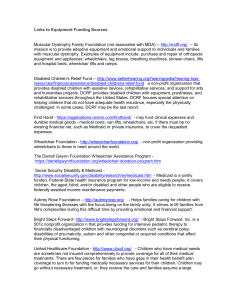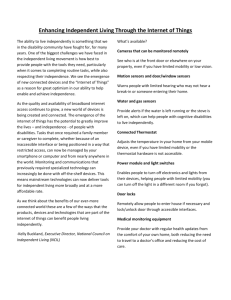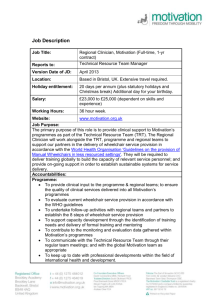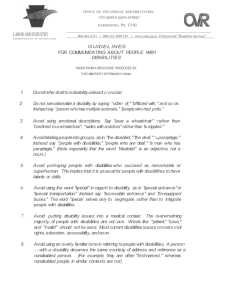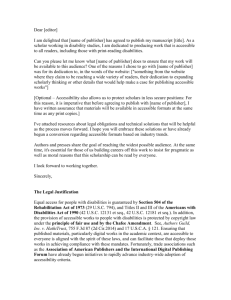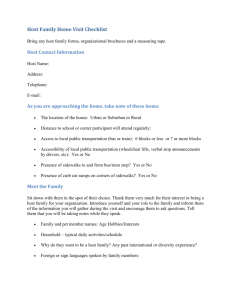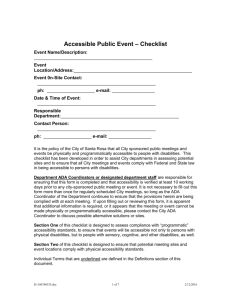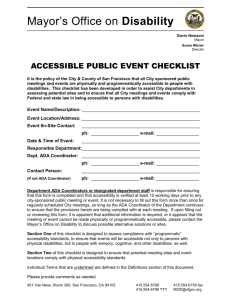Accessibility Standards - Ministry of Health and Social Services
advertisement
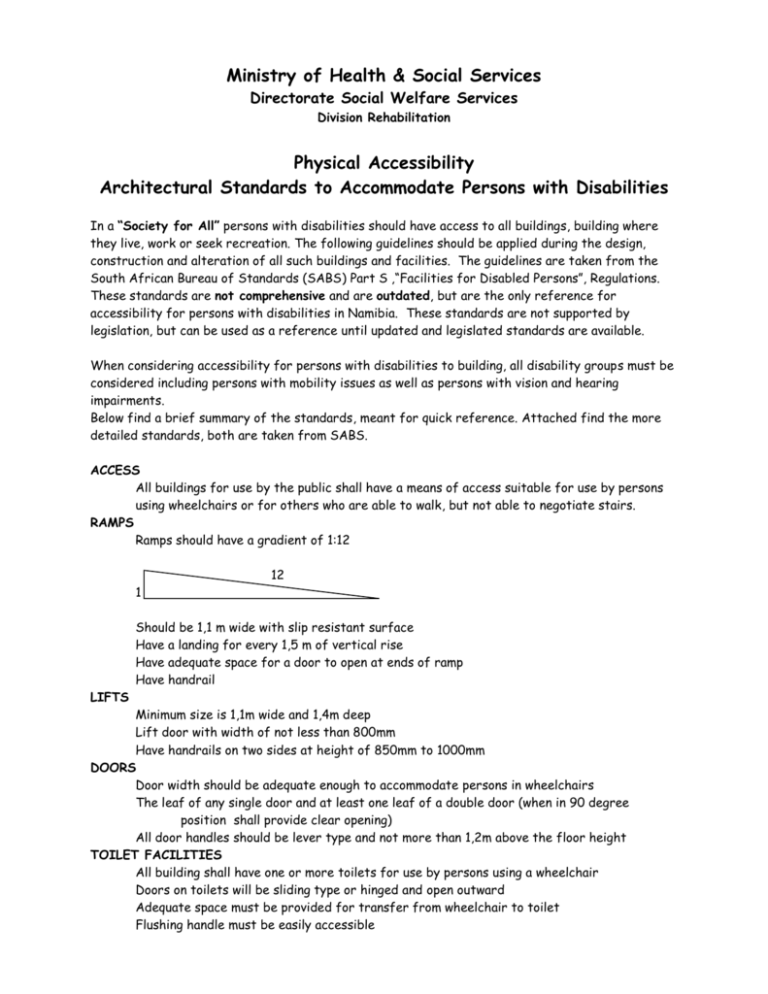
Ministry of Health & Social Services Directorate Social Welfare Services Division Rehabilitation Physical Accessibility Architectural Standards to Accommodate Persons with Disabilities In a “Society for All” persons with disabilities should have access to all buildings, building where they live, work or seek recreation. The following guidelines should be applied during the design, construction and alteration of all such buildings and facilities. The guidelines are taken from the South African Bureau of Standards (SABS) Part S ,“Facilities for Disabled Persons”, Regulations. These standards are not comprehensive and are outdated, but are the only reference for accessibility for persons with disabilities in Namibia. These standards are not supported by legislation, but can be used as a reference until updated and legislated standards are available. When considering accessibility for persons with disabilities to building, all disability groups must be considered including persons with mobility issues as well as persons with vision and hearing impairments. Below find a brief summary of the standards, meant for quick reference. Attached find the more detailed standards, both are taken from SABS. ACCESS All buildings for use by the public shall have a means of access suitable for use by persons using wheelchairs or for others who are able to walk, but not able to negotiate stairs. RAMPS Ramps should have a gradient of 1:12 12 1 Should be 1,1 m wide with slip resistant surface Have a landing for every 1,5 m of vertical rise Have adequate space for a door to open at ends of ramp Have handrail LIFTS Minimum size is 1,1m wide and 1,4m deep Lift door with width of not less than 800mm Have handrails on two sides at height of 850mm to 1000mm DOORS Door width should be adequate enough to accommodate persons in wheelchairs The leaf of any single door and at least one leaf of a double door (when in 90 degree position shall provide clear opening) All door handles should be lever type and not more than 1,2m above the floor height TOILET FACILITIES All building shall have one or more toilets for use by persons using a wheelchair Doors on toilets will be sliding type or hinged and open outward Adequate space must be provided for transfer from wheelchair to toilet Flushing handle must be easily accessible Washbasin must be mounted without legs or pedestal and not more than 830 mm high Water supply taps must be lever type Bath or shower must be designed to allow for easy transfer from wheelchair to seat AUDITORIUMS AND HALLS All auditorium type spaces with fixed seats must provide floor space accessible to a person in a wheelchair This space must be near an exit door OBSTRUCTIONS IN THE PATH OF TRAVEL No protruding objects can obstruct the passage of a wheelchair Any rise or drop of 25mm or more requires a ramp PARKING Parking facilities must be available for persons with disabilities Parking space must be level Should be clearly demarcated as being intended for the use of persons with disabilities only INDICATION OF EXISTENCE OF FACILITIES International symbols should be displayed to indicate accessibility for persons with disabilities Listed below are additional issues which may be considered when addressing accessibility for persons with disabilities. In all offices or businesses where there are counters, the height of the counter should accommodate persons in wheelchairs Thresholds of all doors and entrances should be smooth and barrier free Space Allowance and Reach Ranges Accessible Route from point to point Ground and Floor Surfaces Parking and Passenger Loading Zones Curb Ramps on streets or in parking lots Stairs Entrances Drinking Fountains and Water Coolers Urinals Bathrooms, Bathing Facilities, and Shower Rooms Storage Handrails, Grab Bars, and Tub and Shower Seats Controls and Operating Mechanisms Alarms Detectable Warnings Signage Public Telephones Fixed or Built-in Seating and Tables Automated Teller Machines Dressing and Fitting Rooms November 2010

